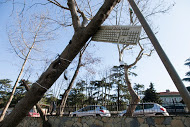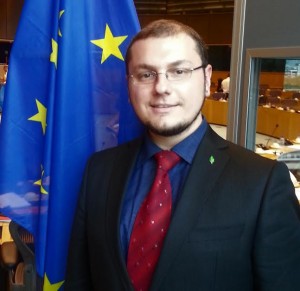This post is also available in: Spanish
A bill that imposes censorship on the internet has brought great turmoil in the Turkish society. Thousands of people keep on demonstrating in the squares of the country, requesting its withdrawal and even cope with the forces of repression! The 5651 Bill that recently passed by the Turkish Parliament provides that a judge may order the inactivation of a web page when there is a complaint from someone that his rights were violated. The Pirate Party of Turkey is participating in the protests with all its strength and organizing original events against censorship, surveillance and the suppression of rights, such as the public hanging of the tools of freedom on the tree of censorship. It is a symbolic act that reflects, however, the secret thoughts of the people in Turkey.
“Recently, European Court of Human Rights approved that Law no. 5651 entitled “Regulation of Publications on the Internet and Supression of Crimes Committed by Means of Such Publication” is a censorship bill and seemingly most of the authorities and international media agree on that Turkey jeopardizes its accession to the European Union” Gürkan Özturan, blogger and Selin Kaledelen, lawyer, both members of Pirate Party of Turkey told in their interview to Pirate Times.
But what is really happening in Turkey? How blurred is this law that recently was voted by the Turkish parliament? How did the whole thing started? Gürkan and Selin replied:
Pirate Times:There is a video with Turkish Pirates hanging a lot of computer gadgets on a “censorship tree”. What was that event about?
Gürkan Özturan, Selin Kaledelen: During the first days of #OccupyGezi protests, our prime minister had said “they should be hanged on those trees, that’s what they are used to” regarding the young people who stood up for their rights. In the light of his remarks and the shadow of a revised and strenghtened censorship bill, we have decided to take up our computer gadgets that we had been hiding in our shoe boxes and hang them on censorship trees. (It is significant to note that in december 2013 it was found out that sons of ministers of cabinet were hiding their profits from governmental corruption and bribery in shoe boxes in their homes; and also important to note that it was the imperial punishment method to get executed through getting hanged on trees when one stood up against state’s will).
PT:What was the main reason that the new legislation on the internet was introduced in Turkey?
GÖ,SK: Restrictive attitudes from AKP government are no stranger to citizens in Turkey. Long before this bill renewal was brought to daily agenda, there have been several other cases and restrictive measures against all platforms where freedom of speech and right to acquire information were to be guaranteed. Print and visual media are under heavy pressure apart from legal censorship (coming up from broadcast bans) and illegal pressure to force self-censorship (such as prime minister calling TV executive in the middle of the night to get a certain item taken down from the news). Thus the new legislation must have been on the table for much longer than we can think contrary to many people’s belief that it came up in the aftermath of corruption probe which started on December 17th. Even before that the political rumours mentioned TIB (Telecommunications Information State Department) would be incorporated into the state’s national information agency, MIT. The latest events might be seen as a trigger, yet it is important to note that restrictive, censorship, surveillance measures have always been one of AKP’s crisis-handling or even governing strategy.
PT:According to this Bill, can anyone appeal to the State Telecommunications Committee or even the courts, to judge and to block any posted material that supposedly violates his/her privacy?
GÖ,SK: The new bill is more restrictive than as it was before. In 2007, when the bill in question was introduced, the people’s reaction was more intense and for the first time in Turkish political history, a demonstration was held for the internet freedom. The interpretation of this bill is up to judges and prosecutors who are not able to use internet or information systems properly. Another innovation regarding the new bill is the obligation of receiving the cencorship and blocking judgements within 24 hours after the related complaint done by the right holder. To implement those court orders, an union called “Internet Service Providers Union” (ISPU) will be established and and this union will apply the court orders within 4 hours. The membership for this union is compulsory for the service providers otherwise they won’t be able to practice and their licence will be cancelled. Deemed complaint can be done by the right holder directly to the court without contacting service or content provider. Recently, European Court of Human Rights approved that Law no. 5651 entitled “Regulation of Publications on the Internet and Supression of Crimes Committed by Means of Such Publication” is a censorship bill and seemingly most of the authorities and international media agree on that Turkey jeopardizes its accession to the European Union.
PT:Isn’t this Bill blurred?
GÖ,SK: Yes it is blurred and that allows much room to interpretation. This way authorities can exploit and misuse to law to block additional websites and web pages to make the internet censorship all the more efficient. It is a deliberate effort.
PT:The Turkish Parliament voted for this Bill, allthough from the beginning of its announcement there were a lot of protests with thousands of people in the squares and streets of the capital of the country and a lot of other cities. In which political parties do those people belong?
GÖ,SK: The bill was signed without proper social or political debate unfortunately. Neither the governing AKP’s nor opposition deputies have had enough time to focus on the impact the law would have on society and basic rights and freedoms. However several NGOs, including Pirate Party of Turkey as well, have analyzed the draft bill in detail and informed the citizens. It is hard to detect who was on the streets protesting of course, but not impossible to say that majority of them were from parties other than AKP and there were even several fellow protestors who had voted for AKP in the last elections. It would be appropriate to say that the streets welcomed those who are fed up with censorship of all kinds, restrictions, surveillance, citizen-profiling and all other oppressive policies.
PT:What was the reaction of the Pirate Party of Turkey?
GÖ: We, the pirates of Turkey have been analyzing and criticising the new bill in detail from the day one of its drafting. Since we have seen the document the first time, we have studied in what ways it might be used to undermine our fundamental rights and liberties; and we have started asking the signatories about these findings on social media platforms which they have “successfully” ignored. So, we have started our campaign to draft a declaration where all citizens are invited to contribute on an open document. We have spread our declaration and started a social media campaign to inform as many fellows as possible. As part of our campaign we have also started the “Censorship Trees” campaign with videos and photographs.
PT: How can people protect themselves from falling victims to censorship?
GÖ,SK: We have few suggestions regarding the protection and remain anonymous on the internet. But before finding the way outs about how to sneak in or sneak out, we believe the society has to to push lawmakers and the authority to introduce more human right friendly bills and codes. There are several ways to be anonymous and cover your tracks on the internet by using VPN, or TOR but none of them are %100 safe since there is no unhackable code or system around world. We, the pirates of Turkey have been working on some projects such as Meshnet (establishing your own internet via wi-fi modems) and organizing some workshops and tutorials in terms of raising an awareness. In regard to liability, TOR could be tricky for the ports which provide the information flow between the computer/system and the search engine. But this problem will be solved soon.
More about the Bill
Internet Censorship is on the Decline? Not a Chance!
Images CC-BY-SA, PPTR

The English “pirate” is derived from the Greek word “πειρατής” (peiratēs) and this in turn from the verb “πειράομαι” (peiráomai), “I attempt”, which is a derivative of the noun “πείρα” (peîra), “experience”. Coming from the depths of the centuries, the word “pirate” took on another dimension in our days. The ruling classes saw pirates as rebels and hated them. Rebels without a state, they were not submissive to any law, except from the laws they instituted themselves, improvising together. This is the feeling of a Pirate: when something doesn’t work, you have to attempt to bring a new concept. Sometimes it goes beyond a certain point and perhaps exceeds certain limits, because it is an expression of challenge; the challenge to change the system. I’m a member of the Board (and former chairman) of Pirate Party of Greece, also a member of press team of PPGR, former journalist, now a free lancer. I’m in the team of Pirate Times from the start, I joined voluntarily and consciously because I am interested to meet pirates from around the world, to exchange views and spread the pirate spirit.
This post is also available in: SpanishA bill that imposes censorship on the internet has brought great turmoil in the Turkish society. Thousands of people keep on demonstrating in the…

















Recent Comments